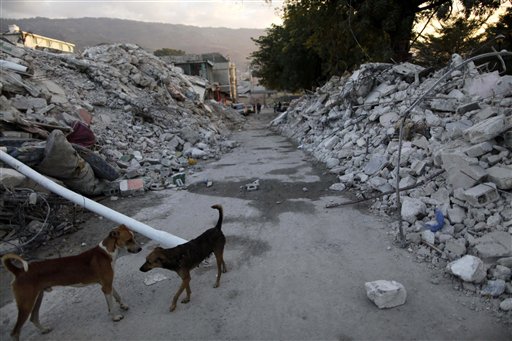Group tackles animal welfare in Haiti after quake
Animal welfare groups arrived in Haiti on Saturday to help protect earthquake victims by vaccinating stray dogs and maintaining the health of livestock.

Stray dogs are seen at a road covered by debris in the aftermath of the Jan. 12 earthquake in Port-au-Prince. Animal welfare groups arrived in Haiti Saturday to help protect earthquake victims by vaccinating stray dogs and maintaining the health of livestock.
AP Photo
One of the biggest animal-related threats posed by the magnitude-7.0 quake, which killed an estimated 200,000 people and left thousands more homeless, is an increased incidence of rabies, said Ian Robinson, of the International Fund for Animal Welfare.
"When you get situations with a large group of displaced people, and hungry dogs wandering around, then you've got the opportunities for dog bites to occur, and that obviously leads to the spread of rabies," he told The Associated Press."The concept of pets is quite foreign to Haitians," said Karen Ashmore, executive director of the Lambi Fund agricultural group in Haiti. "Most Haitians can barely feed themselves, much less a pet."
Robinson and Huerta's groups — the world's two largest for animal welfare — have joined a dozen partners to respond to protection and public health issues related to animals in Haiti.
The Animal Relief Coalition for Haiti will start by vaccinating stray dogs against rabies, said one official. They also will round up dogs to feed and protect them. Stray dogs have been forming packs, sometimes eating human remains.
"There's nothing more difficult to watch than a semi-feral animal eating a human remain," said Dick Green of International Fund for Animal Welfare. "So the people react in the way you would expect them to react — they kill them. They either club them or shoot them or do something to them because they don't want that to happen. And the dog is just trying to survive."
The coalition is reaching out to rural farmers whose lives depend on pigs, goats and chickens. A small Haitian Creole piglet will eat and forage in weeds, fatten quickly and sell for a good price, said Ashmore, whose Lambi Fund helps Haitians by giving them a starter pig or goat, veterinary care for a year and instructions on how to milk or mate the animals.
Goats account for 40 percent to 50 percent of the livestock in Haiti, Green said. He expects they will find some who've been injured by walking through rubble.
Many animals also suffer loss of productivity, he added: "This is a stressful time. Some of the cows and goats won't give milk."
The coalition plans to distribute food to farmers to help sustain them until they get back on their feet.
If families are fed, animals that live off their food scraps will be fed, Green said.
Animal relief groups are using Web sites, Twitter, Facebook and every means they can find to raise money for the effort. So far, they have received about $140,000 in donations, but "it will be a million-dollar project for sure," Green said.
"It's public health," said Heather Case, of the American Veterinary Medical Association. "It's animal welfare, and it's what we need to do following a disaster."

